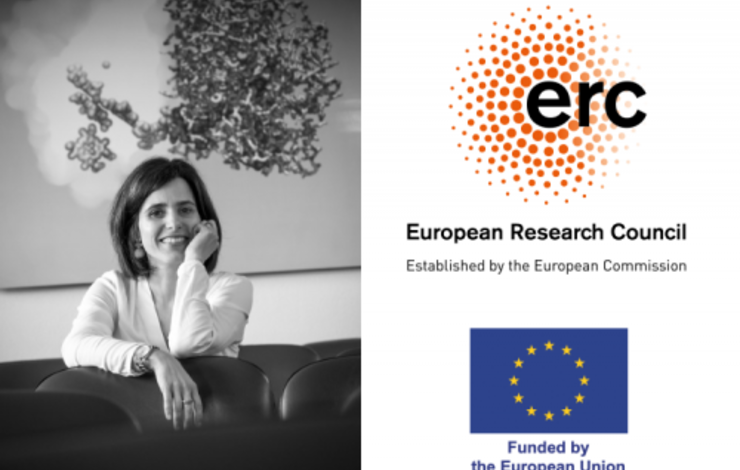15-04-2024

Cecília Roque, leader of the Biomolecular Engineering Laboratory at UCIBIO-NOVA FCT was distinguished with a European Research Council (ERC) Proof of Concept grant with the project UNMASK: Unraveling Parkinson ́s disease diagnostic. This is the researcher’s third ERC Grant, ensuring continuous funding from the council since 2014 for her work in non-invasive diagnostics. The UNMASK project will be funded with 150,000€ to validate the technological and business feasibility of an innovative method for the smell-inspired technologies for the diagnosis of neurodegenerative diseases such as Parkinson's and Alzheimer's diseases.
Since Hippocrates' time, about 2400 years ago, smell has been used as evidence of disease. By employing modern bioengineering and artificial intelligence (AI) tools, Cecília Roque’s team has been putting smell-inspired diagnostics on the map for future clinical diagnostics. Within the scope of the ERC Starting Grant - SCENT, Cecília Roque’s team worked in the field of artificial olfaction and smell-inspired technologies such as the electronic nose. The initial SCENT grant has pioneered an innovative class of bio-based materials, for example using gelatin, which are sensitive to volatile compounds (odours) and other disease biomarkers released from the body. “The new materials change their properties in the presence of disease biomarkers, generating signals that are collected and then analysed by artificial intelligence tools”, explains Susana Palma, a team member of the project. These artificial nose systems find patterns of distinct biomarkers in complex biological samples, thus can be used to detect fingerprints associated with certain diseases.
Currently, most clinical diagnostic tools are still invasive, which means that they require the collection of blood or other body samples, often causing the patient stress, pain and discomfort. After developing the SCENT technologies, the team has been focusing on the technology and market validation of their olfaction-inspired technologies. Despite having numerous applications, “our aim is to validate SCENT technologies for fast and patient-compliant diagnostic tools, using body samples collected in a non-invasive manner, such as urine, as the source for disease diagnostics. We are also looking at clinical applications for which the current diagnostic tools are costly, lengthy or not-existent at all”, says Cecília Roque, PI of the research team.
The technology and market validation of Cecília Roque’s team is being made possible due to ERC funding with two Proof of Concept grants. The first ERC Proof of Concept grant, ENSURE, is focusing on the validation of the technology towards the follow-up of bladder cancer “as we aim to alleviate patients and doctors by reducing the number of invasive procedures”, adds team member Carina Esteves. With the newly awarded ERC Proof of Concept grant, UNMASK, Cecília Roque’s team will validate the smell-inspired technologies for the diagnosis of neurodegenerative diseases such as Parkinson's and Alzheimer's diseases, which affect a large portion of society with very high economic and societal burden. The research team will work closely with clinical collaborators from hospitals to validate the technological component of the project, and with the Italian team DayOne for business validation and development.
The ERC Proof of Concept Grant is awarded exclusively to Principal Investigators who have previously won an ERC grant. Its primary goal is to support the commercial and social innovation potential of ERC-funded research. In addition to Cecília Roque, Albino Oliveira-Maia, from Champalimaud Foundation, and Cristina Silva Pereira, from ITQB NOVA, were also awarded a Proof of Concept Grant.
In the news:
Nariz eletrónico de Cecília Roque, da NOVA FCT, em destaque no programa “Ciência”, Antena 2
Universidade Nova de Lisboa cria nariz eletrónico que pode detetar Parkinson, RTP
Quatro cientistas portugueses recebem bolsas do Conselho Europeu de Investigação, Público
Três investigadores portugueses recebem bolsas ERC de 150 mil euros cada, Visão
Três investigadores portugueses recebem bolsas ERC de 150 mil euros cada, Lusa
Três investigadores portugueses recebem bolsas ERC de 150 mil euros cada, Notícias ao Minuto
Conselho Europeu de Investigação vai apoiar mais cinco projetos portugueses, Pontos de Vista
Portugal recebe 3 bolsas do Conselho Europeu de Investigação na área das Ciências da Vida, Atlas Saúde
Conselho Europeu de Investigação vai apoiar cinco projetos portugueses com 2,1 milhões, Jornal Económico
Conselho Europeu de Investigação vai apoiar mais 5 projetos portugueses, FCT, IP